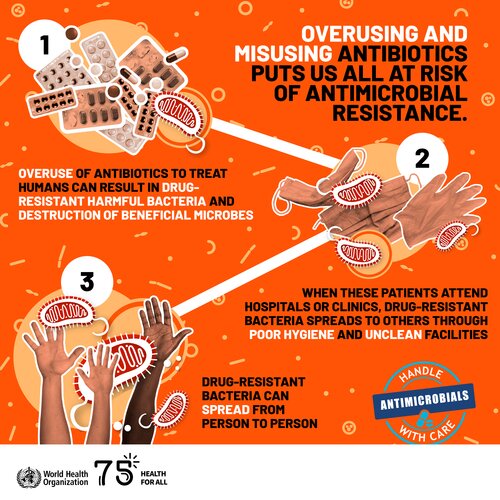Global health leaders and stakeholders gathered in Berlin last...
6 November 2023
A statement from UHC2030’s Co-Chairs on the occasion of the World AMR Awareness Week

This week, advocates raise awareness for the threat of antimicrobial resistance (AMR). AMR occurs when bacteria, viruses, fungi, and parasites no longer respond to antimicrobial agents. As a result of drug resistance, antibiotics and other antimicrobial agents become ineffective and infections become difficult or impossible to treat, increasing the risk of disease spread, severe illness and death. Antimicrobials - including antibiotics, antivirals, antifungals and antiparasitics - are medicines used to prevent and treat infections in humans, animals, and plants. Left unchecked, AMR will roll back a century of medical progress, damage the environment, interrupt food production, cause more people to fall into extreme poverty and imperil global health security.
The fight against AMR and efforts to achieve universal health coverage (UHC) are closely interlinked. UHC means that everyone, everywhere, has access to the health services they need without financial hardship. Achieving this goal is becoming more difficult with increasing AMR, which makes the provision of health care more challenging, less effective, and more expensive. On the other hand, UHC offers a great potential for addressing AMR:
First, strengthening health systems to provide better quality health care through a people-centered primary health care approach can help promote prevention, timely diagnosis and appropriate treatment of (drug-resistant) infections. Over the past decades, antimicrobials have been used as a substitute for good quality health care, particularly in countries with weak health systems. Antimicrobials have enabled health facilities to provide sophisticated treatments without investing in hygiene to reduce exposure to infections. While the indiscriminate use of antimicrobials provides a quick way to care for patients, the resulting excessive exposure of people to antimicrobials is contributing to the emergence and spread of AMR, making these medicines less effective for everyone.
Second, better quality health care can decrease healthcare-associated infections. If health facilities have access to water, sanitation, and hygiene, as well as practice good infection prevention and control, infections occurring in health facilities can be reduced.
Third, strengthening the affordability of health services can increase access to high-quality antimicrobials when needed. Burdened with high out-of-pocket health expenditures, patients from low-income households are often unable to pay for the healthcare advice, diagnostics, or antimicrobials they need. As a result, they may have to buy medicines over the counter without a prescription or on the black market that are often substandard or falsified, or consume incomplete courses of antimicrobials, thereby hastening AMR.
Fourth, strong health systems are needed to ensure the ongoing effectiveness of newly developed antimicrobials. In recent years, efforts to discover new antimicrobials have become essential to addressing AMR. However, new effective medicines will not remain effective for long if they are introduced to contexts in which systems for managing infection remain weak. This means having a health system with a reliable supply of high-quality and affordable antimicrobials and laboratory supplies, preventive measures and proper diagnostics and appropriate treatment, as well as a well-trained and motivated health and care workforce working in clean and safe facilities to reduce the emergence and spread of drug-resistant infections and provide quality care for optimal patient outcome.
During this year’s World AMR Awareness Week, let’s acknowledge the critical interlinkage between AMR and UHC to address one of the greatest public health threats of our time. Both UHC and AMR require political leadership and collaboration that goes beyond health: this is why we call on governments to translate into action the commitment to strengthening universal health coverage, which was reiterated at the UN high-level meeting on UHC this year. At next year’s high-level meeting on AMR, let’s make sure governments take advantage of the unique opportunity to build on these commitments and leverage UHC to address AMR. You can count on us and partners from the UHC Movement!
By Gabriela Cuevas and Justin Koonin, Co-chairs of UHC2030 Steering Committee
